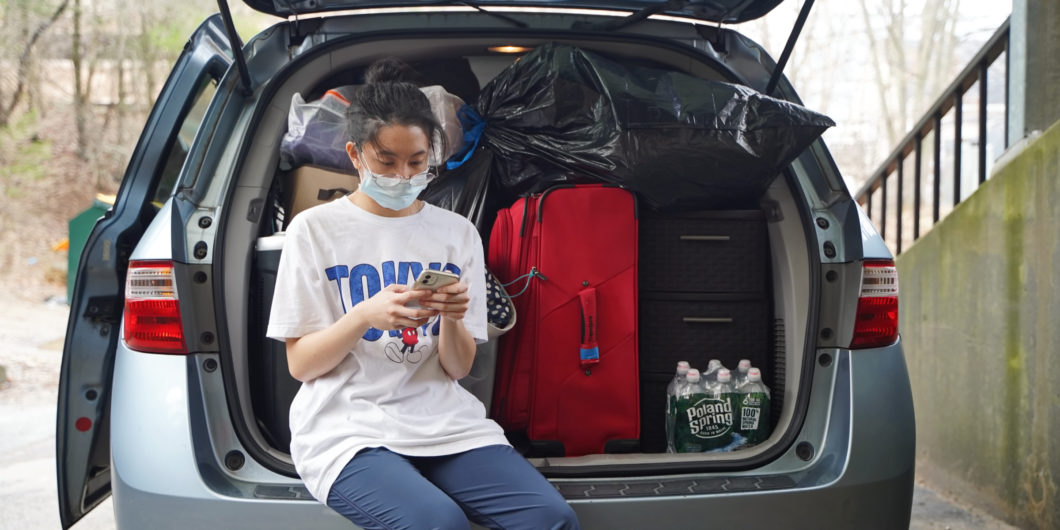The COVID pandemic and Russia's invasion of Ukraine have both reaffirmed the importance of the free nation-state.
Playing the Hand We're Dealt
Dear Corona Graduates,
First of all, congratulations to you on your achievement! Nothing should be allowed to take that fact, and the satisfactions of the day, away from you. And yet, it would not do to mark the commencement of your post-collegiate life without acknowledging that you’re being deprived of the full blessing of this day, the formal and ceremonial marker of your passage into a new phase of your life. I regret that fact enormously. And yet…. is there a way to see this loss as a gain in deep disguise? Let’s see.
There is a certain feeling of unreality, for most of us, about this suspension of life that we’re going through. Everything that we know, or think we know, about the causes of it is being brought to us remotely, in the form of abstractions and numbers and decontextualized images and competing graphs. Lost in a welter of conflicting data and explanations, all of it contaminated by the politics of a presidential election year, we cannot feel any confidence that we really know what’s going on.
But there are a few things we do know. One of them is that the mass quarantining of the nation has made plain, for those with eyes to see it, a yawning class division in the country, between those of us who can afford to stay home—and may in fact be having a rather pleasant time doing so—and those whose lives and livelihoods are under enormous stress, and in some cases in the process of being destroyed. Some of the emerging resistance to strict lockdown policies, as in Michigan and Pennsylvania, has to do with this class division. Those who are getting paid regularly and securely tend to think mainly about the exigent public-health issues, and favor lengthier lockdowns. That is how college-educated people are trained to think. A lot of the time, though, they really don’t comprehend the effects of such policies on people whose lives are dramatically different from theirs.
There can be moments, however, when an awareness breaks through. You see the delivery man at the door, or the grocery-store clerk in the checkout line, or the vastly reduced staff at your favorite restaurant, now functioning as a takeout joint—any number of people who are out there in the world, doing the things that need doing, making themselves vulnerable because they have no choice—and you realize that you are not experiencing the same hard reality as those people. Even with all the anxieties you are feeling, as you step into this strange and unpromising economic climate, you should remember these people too, and not support policies that are blind to their needs.
This relates in turn to a larger issue: the fact that the most comfortable among us seem to have lost a realistic sense of what an inherently risky proposition life is. The art of living means finding a graceful and dignified way to negotiate life’s hazards and dangers. I wish that our colleges were more helpful in that process, instead of increasingly catering above all else to our desire never to be made uncomfortable, and to wail like babies when we are. But be glad and grateful if you are graduating from a college in which you’ve studied writers like Sophocles, Shakespeare, Dostoevsky, and Camus, authors whose works can prepare you for that work of negotiation.
So we’ve been reminded that life is dangerous, and that pandemics are nothing new in human history, even in very recent American history. And yet we act as if this particular one represents the end of the world, or the return of the Black Plague. Don’t fall for that hysterical rubbish. And please don’t waste your time with the self-pitying and useless mantra that yours is “the screwed generation,” the unbecoming cry of the entitled. Every generation is born into a world it didn’t make, into a mess of which it was not the author. History is about playing the hand we’re dealt, and maybe improving the hand as we go. Take to heart instead these lucid words of C.S. Lewis, speaking in 1939 to an audience of Oxford students just after the outbreak of the Second World War:
The war creates no absolutely new situation: it simply aggravates the permanent human situation so that we can no longer ignore it. Human life has always been lived on the edge of a precipice.
And there it is. As graduates of the class of 2020, you will have the benefit of knowing in your bones that this is true. That benefit may seem dubious to you now. But the day will come when you will see it differently.



